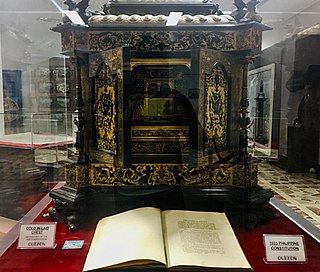
In political science, an initiative is a means by which a petition signed by a certain minimum number of registered voters can force a government to choose to either enact a law or hold a public vote in parliament in what is called indirect initiative, or under direct initiative, the proposition is immediately put to a plebiscite or referendum, in what is called a Popular initiated Referendum or citizen-initiated referendum.
In the Philippines, regions are administrative divisions that primarily serve to coordinate planning and organize national government services across multiple local government units (LGUs). Most national government offices provide services through their regional branches instead of having direct provincial or city offices. These regional offices are usually located in the city designated as the regional center.
A city is one of the units of local government in the Philippines. All Philippine cities are chartered cities, whose existence as corporate and administrative entities is governed by their own specific municipal charters in addition to the Local Government Code of 1991, which specifies their administrative structure and powers. As of September 7, 2019, there are 146 cities.
A constitutional amendment is a modification of the constitution of a polity, organization or other type of entity. Amendments are often interwoven into the relevant sections of an existing constitution, directly altering the text. Conversely, they can be appended to the constitution as supplemental additions (codicils), thus changing the frame of government without altering the existing text of the document.
A supermajority or supra-majority or a qualified majority, also called Special Majority, is a requirement for a proposal to gain a specified level of support which is greater than the threshold of more than one-half used for majority. A supermajority in a democracy can help to prevent a small majority from eroding fundamental rights of a large minority. Changes to constitutions, especially those with entrenched clauses, commonly require supermajority support in a legislature. Parliamentary procedure requires that any action of a deliberative assembly that may alter the rights of a minority have a supermajority requirement, such as a two-thirds vote.

The Constitution of the State of Connecticut is the basic governing document of the U.S. state of Connecticut. It was approved by referendum on December 14, 1965, and proclaimed by the governor as adopted on December 30. It comprises 14 articles and has been amended 31 times.
The Bell Trade Act of 1946, also known as the Philippine Trade Act, was an act passed by the United States Congress specifying policy governing trade between the Philippines and the United States following independence of the Philippines from the United States. The United States Congress offered $800 million for post World War II rebuilding funds if the Bell Trade Act was ratified by the Philippine Congress. The specifics of the act required the 1935 Constitution of the Philippines be amended. The Philippine Congress approved the measure on July 2, two days before independence from the United States of America, and on September 18, 1946 approved a plebiscite to amend the Constitution of the Philippines.
The Legislative district of San Juan–Mandaluyong was the combined representation of the Metropolitan Manila municipalities of Mandaluyong and San Juan in the Regular Batasang Pambansa (1984–1986) and the lower house of the Congress of the Philippines (1987–1995).
The Interim Batasang Pambansa was the legislature of the Republic of the Philippines from its inauguration on June 12, 1978 to June 5, 1984. It served as a transitional legislative body mandated by the 1973 Constitution as the Philippines shifted from a presidential to a parliamentary form of government.
The Legislative district of Las Piñas–Parañaque was the combined representation of the Metropolitan Manila municipalities of Las Piñas and Parañaque in the Regular Batasang Pambansa from 1984 to 1986.
The Legislative district of Taguig–Pateros–Muntinlupa was the combined representation of the Metropolitan Manila municipalities of Muntinlupa, Pateros and Taguig in the Regular Batasang Pambansa from 1984 to 1986.
The Legislative district of Malabon–Navotas–Valenzuela was the combined representation of the Metropolitan Manila municipalities of Malabon, Navotas and Valenzuela in the Regular Batasang Pambansa from 1984 to 1986.
The Legislative district of Pasig–Marikina was the combined representation of the Metropolitan Manila municipalities of Pasig and Marikina in the Regular Batasang Pambansa from 1984 to 1986.
The Legislative district of Lanao was the representation of the historical province of Lanao in the various national legislatures of the Philippines until 1969. Marawi and Iligan also remained part of the province's representation even after becoming chartered cities in 1940 and 1950, respectively.
The National Assembly of the Philippines refers to the legislature of the Commonwealth of the Philippines from 1935 to 1941, and of the Second Philippine Republic during the Japanese occupation. The National Assembly of the Commonwealth was created under the 1935 Constitution, which served as the Philippines' fundamental law to prepare it for its independence from the United States of America.
Constitutional reform in the Philippines, also known as Charter Change, refers to the political and legal processes needed to amend the current 1987 Constitution of the Philippines. Under the common interpretation of the Constitution, amendments can be proposed by one of three methods: a People's Initiative, a Constituent Assembly or a Constitutional Convention.
People's Initiative is a common appellative in the Philippines that refers to either a mode for constitutional amendment provided by the 1987 Philippine Constitution or to the act of pushing an initiative allowed by the Philippine Initiative and Referendum Act of 1987. The appellative also refers to the product of either of those initiatives.

The Constitution of the Philippines is the constitution or supreme law of the Republic of the Philippines. Its final draft was completed by the Constitutional Commission on October 12, 1986 and was ratified by a nationwide plebiscite on February 2, 1987.


